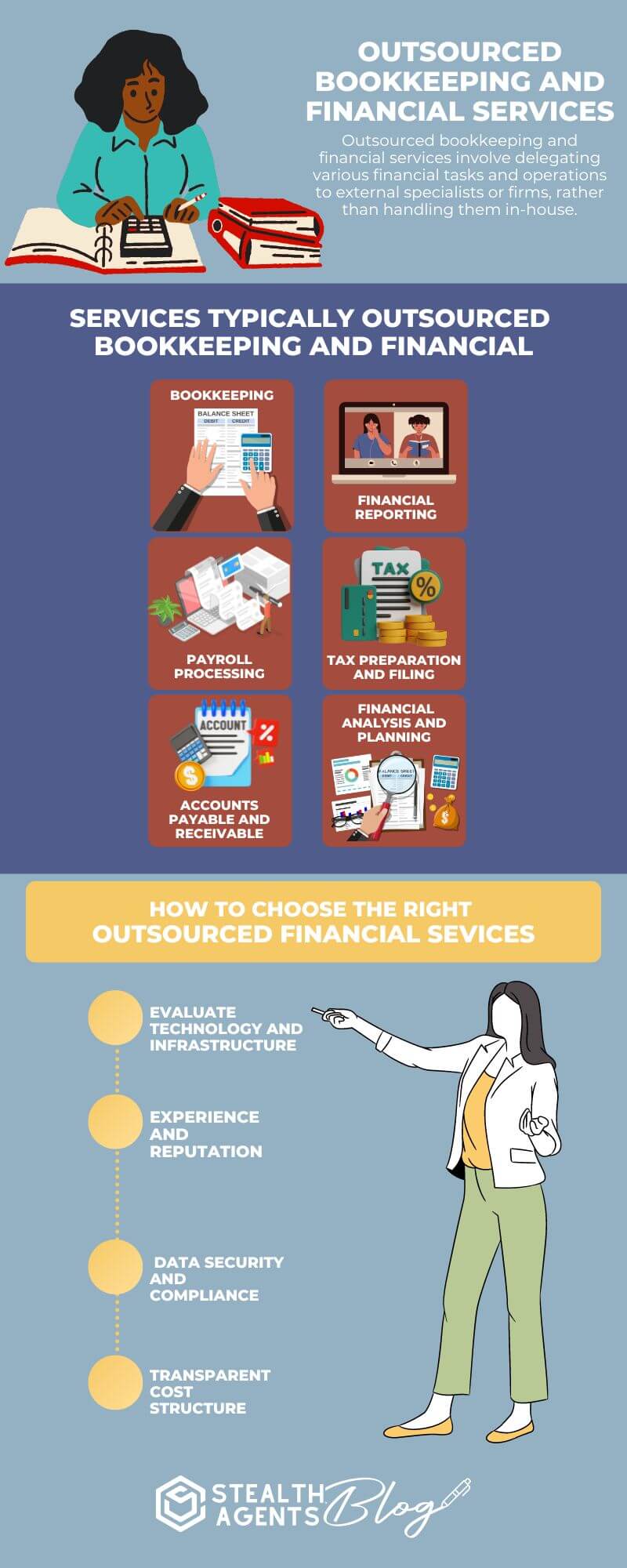Outsourced bookkeeping and financial services help businesses save time, cut costs, and avoid costly errors by handing off their finances to experts. Stealth Agents makes this easy by providing experienced virtual assistants who manage everything from bookkeeping to payroll and financial planning—so you can focus on growing your business stress-free.
Managing your business’s finances can be overwhelming, especially when you’re juggling growth, compliance, and time-sensitive reporting.
Without proper support, even small errors in bookkeeping can snowball into major financial setbacks, lost time, and compliance risks.
That’s where a virtual assistant package specializing in outsourced bookkeeping steps in. By working with a reliable offshore bookkeeper, you can delegate time-consuming financial tasks, reduce overhead costs, and improve your overall accuracy.
With outsourced bookkeeper support, businesses not only free up internal resources but also gain access to expert financial insights that drive smarter decisions.
At Stealth Agents, we provide scalable bookkeeping solutions tailored to your business’s needs no matter your industry or size.
Whether you’re a solo entrepreneur or a growing company, our virtual assistants can help streamline your finances and take the stress out of accounting.
In this guide, we’ll walk you through the benefits of outsourced bookkeeping and how to choose the right support to optimize your operational efficiency.
How Does Local Bookkeeping Work?
Local bookkeeping is all about keeping your finances close to home, whether you prefer face-to-face meetings or managing paper records rather than relying fully on digital tools. This approach is ideal if you want hands-on support, enjoy regular in-person updates, or aren’t quite ready to move everything online.
When it comes to local bookkeeping, you usually have two paths to choose from:
- Freelance Bookkeepers: These professionals often work directly with you, eithonsiteite at your business or remotely. While freelancers may offer more flexibility and potentially lower costs, their experience and expertise can vary. They typically handle your day-to-day financial records, but it’s important to ensure they use secure practices and reliable accounting software—think QuickBooks or Xero.
- Bookkeeping Firms: Working with a local firm generally comes with more structure and built-in backups. For example, if your usual bookkeeper is unavailable, someone else from the team can step in without interruption. Firms may charge higher fees, but they often bring additional assurance, such as the use of certified professionals and established processes for maintaining confidentiality.
No matter which route you choose, keep in mind these best practices:
- Clearly define who has access to your financial data, safeguarding sensitive information like banking and payroll records.
- Ensure you retain control over any treasury-related functions—approving payments, signing checks, or authorizing wire transfers should always remain in your hands.
- Ask about data security and how your records are stored, whether physically or digitally.
Pros and Cons of Hiring a Local Bookkeeper
Thinking about keeping your bookkeeping close to home? Hiring a local bookkeeper—whether a solo freelancer or an established firm—has its unique set of benefits and potential drawbacks. Here’s a quick breakdown to help you decide if this approach suits your business best:
Pros
- Personal Connection: Want face-to-face meetings, quick coffee chats, or someone who understands your local market? A local bookkeeper gives you that in-person interaction and often a more customized touch.
- Physical Records: If your business still runs on paper receipts, handwritten ledgers, or relies on traditional banking, a local pro can help wrangle your documentation the old-fashioned way.
- On-site Support: Need someone to visit your office for audits, set up systems, or create order out of shoeboxes of receipts? Local bookkeepers make house calls possible.
- Accountability: Knowing your bookkeeper is just down the road can add a layer of trust and accountability—especially when it comes to safeguarding sensitive financial details.
Cons
- Cost: Local firms or freelancers might charge more than remote or outsourced teams since you’re paying for geographical convenience and often more personalized service.
- Availability: If your bookkeeper goes on leave or faces an emergency, you may experience gaps in service—unless you work with a larger firm that can provide backup support.
- Limited Scope: Some local bookkeepers may not offer advanced services like financial forecasting or integration with modern software platforms such as QuickBooks Online or Xero.
- Security Concerns: Even with the local connection, always be vigilant—never hand over control of your investments or authority to make payments. You should remain the only person authorized to sign checks or process wires.
Typical Costs of In-House Bookkeeping
Before diving into outsourcing, it’s important to understand the real costs associated with in-house bookkeeping. Hiring a dedicated bookkeeper means factoring in not only their base salary—often falling between $40,000 and $51,000 annually according to Salary.com—but also additional expenses like payroll taxes, employee benefits, and ongoing training.
For many businesses, especially those that only require routine tasks like bank reconciliations or monthly reporting, a full-time in-house bookkeeper might feel like paying for a luxury car when a compact would do. Smaller companies sometimes opt for part-time bookkeepers or split responsibilities across roles to offset costs, but even then, expenses can add up.
And don’t forget the hidden costs: recruiting, onboarding, and managing another team member all take time (and money) away from your core business. This is why so many organizations are rethinking the traditional in-house model and turning to more flexible, cost-effective bookkeeping solutions.
Pros and Cons of Virtual Bookkeeping
If you’re considering simplifying your financial process, virtual bookkeeping brings a modern, streamlined solution that suits today’s web-savvy businesses. But, as with any approach, there’s a balance of perks and potential drawbacks.
The Benefits
- Time Savings: Say goodbye to the days of sorting paper receipts or manually entering data. Virtual bookkeepers handle your day-to-day finances online, freeing your schedule for high-impact work.
- Up-to-Date Technology: Virtual bookkeeping leverages digital tools and secure cloud storage, so your records are organized, backed up, and easy to share with accountants or stakeholders.
- Flexibility & Affordability: Many providers offer subscription plans or flat fees, so you know exactly what you’re paying each month—no surprise billable hours.
- Professional Oversight: With qualified experts managing your books remotely, you gain peace of mind and up-to-date insights for smarter business decisions.
The Drawbacks
- Limited Face-to-Face Interaction: Some business owners still prefer the personal feel of in-person meetings. With virtual bookkeeping, most communication happens via chat, email, or phone.
- Security Concerns: While cloud-based platforms use advanced encryption and protection, sharing sensitive financial information online requires vigilance against cybersecurity threats. Partnering with reputable providers is key.
- Dependence on Internet Access: Unreliable internet connectivity can temporarily limit your access to information or communication with your bookkeeper.
- Learning Curve: Adapting to new software or platforms may require an adjustment period, especially if you’re new to digital accounting tools.
Freelance Bookkeeper vs. Bookkeeping Firm: What’s the Difference?
When considering outsourced bookkeeping, it’s important to know whether a freelance bookkeeper or a bookkeeping firm best suits your business needs.
Freelance Bookkeepers
A freelance bookkeeper is typically an independent professional who works directly with you—sometimes even in person—handling your books on a more personal level. This option is ideal if you want flexibility, direct communication, and often a lower cost. Freelancers can often adapt to your preferred workflow, whether you use paper records or digital tools. However, their expertise, availability, and reliability can vary, and coverage can become an issue if they’re unavailable due to time off or unexpected events.
Bookkeeping Firms
On the other hand, a bookkeeping firm is usually a team-based solution with multiple professionals supporting your account. While firms may charge a bit more than freelancers, they often provide additional peace of mind:
- Access to a pool of certified professionals
- Continuity, even if your dedicated bookkeeper is unavailable
- Standardized processes and stronger data security practices
Firms are also well-equipped to handle bookkeeping at scale and may offer guarantees or error correction services.
Which Should You Choose?
The decision depends on your preferences for budget, communication style, and need for reliability. If you prefer one-on-one support and flexibility, a freelancer might be right for you. If business continuity, security, and expert backup are priorities, a firm could offer more assurance.
No matter which you choose, always ensure you retain control over your business’s funds—never hand over full signing authority to any external bookkeeper. This helps protect your finances while getting the bookkeeping support you need.
When to Hire an In-House Bookkeeper
There comes a point in every business’s journey when your financial needs begin to outpace what outsourced solutions can provide. So, when should you think about bringing bookkeeping in-house?
- Complex Financial Demands: If your business is experiencing rapid growth, handling a high volume of transactions, or facing increasingly complex financial scenarios—such as advanced forecasting, detailed reporting, or multi-entity consolidation—it may be time to consider an in-house bookkeeper.
- Need for Daily Support: If you require frequent, real-time financial support rather than periodic check-ins, having someone on staff ensures immediate access and more personalized management.
- Cost-Benefit Consideration: While hiring in-house involves higher upfront costs (think salary, payroll taxes, and benefits), it could be worthwhile if you need a dedicated professional fully immersed in your operations. For reference, an in-house bookkeeper’s annual salary typically ranges from $39,000 to $51,000 in the U.S.—excluding additional costs.
- Hybrid Solutions: Not quite ready for a full-time hire? Many businesses start by engaging a part-time bookkeeper or combining bookkeeping duties with other administrative roles. This can help you scale support while balancing your budget.
How Does Local Bookkeeping Work?
Local bookkeeping is all about keeping your finances close to home, whether you prefer face-to-face meetings or managing paper records rather than relying fully on digital tools.
This approach is ideal if you want hands-on support, enjoy regular in-person updates, or aren’t quite ready to move everything online.
When it comes to local bookkeeping, you usually have two paths to choose from:
- Freelance Bookkeepers: These professionals often work directly with you, eithonsiteite at your business or remotely. While freelancers may offer more flexibility and potentially lower costs, their experience and expertise can vary. They typically handle your day-to-day financial records, but it’s important to ensure they use secure practices and reliable accounting software—think QuickBooks or Xero.
- Bookkeeping Firms: Working with a local firm generally comes with more structure and built-in backups. For example, if your usual bookkeeper is unavailable, someone else from the team can step in without interruption. Firms may charge higher fees, but they often bring additional assurance, such as the use of certified professionals and established processes for maintaining confidentiality.
No matter which route you choose, keep in mind these best practices:
- Clearly define who has access to your financial data, safeguarding sensitive information like banking and payroll records.
- Ensure you retain control over any treasury-related functions—approving payments, signing checks, or authorizing wire transfers should always remain in your hands.
- Ask about data security and how your records are stored, whether physically or digitally.
Pros and Cons of Hiring a Local Bookkeeper
Thinking about keeping your bookkeeping close to home? Hiring a local bookkeeper—whether a solo freelancer or an established firm—has its unique set of benefits and potential drawbacks. Here’s a quick breakdown to help you decide if this approach suits your business best:
Pros
- Personal Connection: Want face-to-face meetings, quick coffee chats, or someone who understands your local market? A local bookkeeper gives you that in-person interaction and often a more customized touch.
- Physical Records: If your business still runs on paper receipts, handwritten ledgers, or relies on traditional banking, a local pro can help wrangle your documentation the old-fashioned way.
- On-site Support: Need someone to visit your office for audits, set up systems, or create order out of shoeboxes of receipts? Local bookkeepers make house calls possible.
- Accountability: Knowing your bookkeeper is just down the road can add a layer of trust and accountability—especially when it comes to safeguarding sensitive financial details.
Cons
- Cost: Local firms or freelancers might charge more than remote or outsourced teams since you’re paying for geographical convenience and often more personalized service.
- Availability: If your bookkeeper goes on leave or faces an emergency, you may experience gaps in service—unless you work with a larger firm that can provide backup support.
- Limited Scope: Some local bookkeepers may not offer advanced services like financial forecasting or integration with modern software platforms such as QuickBooks Online or Xero.
- Security Concerns: Even with the local connection, always be vigilant—never hand over control of your investments or authority to make payments. You should remain the only person authorizedto signg checks orprocessg wires.
Services typically outsourced: bookkeeping and Financial
1. Bookkeeping
This includes recording financial transactions, maintaining accurate books and ledgers, managing invoices, and reconciling bank statements.
Bookkeeping services are often outsourced to reduce the burden on businesses and ensure compliance with financial regulations.
Outsourcing bookkeeping has advantages such as cost savings, access to specialized expertise, and increased accuracy.
It also allows businesses to focus on core activities and strategic decision-making rather than spending time on routine accounting tasks.
Why Hiring a Bookkeeper Can Save You Money
While accountants are essential for tax prep and high-level financial planning, turning to them for day-to-day bookkeeping can quickly drain your budget.
Accountants, especially Certified Public Accountants (CPAs), have specialized qualifications and typically charge higher hourly rates due to their expertise and certifications. When you use an accountant for bookkeeping tasks, you’re essentially paying a premium for work that doesn’t require their advanced skill set.
On the other hand, hiring a bookkeeper—either locally or through an online service—gives your business access to dedicated support year-round, without the hefty price tag. Bookkeepers are trained specifically to record transactions, reconcile accounts, and keep your ledgers accurate, so you get ongoing financial oversight at a lower cost.
With professional bookkeeping handled efficiently, you’re freed up to focus on running your business. Plus, you can reserve your accountant’s expertise for where it matters most: tax strategy, compliance, and big-picture financial planning. This division of labour keeps costs down and ensures you’re always working from up-to-date, reliable financial data.
It also allows businesses to focus on core activities and strategic decision-making rather than spending time on routine accounting tasks.
Can My Accountant Handle Bookkeeping Tasks?
Absolutely—most accountants are equipped to manage your bookkeeping if you ask. However, having your accountant handle day-to-day bookkeeping often isn’t the most cost-effective route for your business.
Accountants, especially CPAs, typically charge higher hourly rates because they’re trained for analytical tasks, tax preparation, and strategic financial planning. When they take on basic bookkeeping, those higher rates add up quickly for work a bookkeeper or virtual assistant can do just as accurately—and far more affordably.
Outsourcing your bookkeeping directly to a dedicated bookkeeper or a reliable virtual assistant service means:
- Lowerlabourr costs compared to CPA rates
- Year-round support and timely financial data
- More freedom to tap your accountant’s expertise only when you need high-level insight or tax preparation.
2. Financial Reporting
Outsourcing firms prepare detailed financial reports, such as income statements, balance sheets, and cash flow statements, which are crucial for internal management and external compliance.
Outsourcing these tasks ensures timely and accurate reporting, reduces the risk of errors, and frees up time for businesses to analyze their financial data.
Outsourcing financial reporting also allows businesses to tap into the expertise of professionalwho are s well-versed in accounting standards and regulations.
It is particularly helpful to bookkeeping businesses that may not have the resources or knowledge to handle complex financial reporting.
3. Payroll Processing
Payroll management is more than just cutting checks—it’s a time-consuming, detail-sensitive process that leaves little room for error.
Miscalculations, tax compliance issues, and benefit mismanagement can lead to costly penalties and employee dissatisfaction. For accountants and firms already stretched thin, handling payroll in-house adds unnecessary pressure.
That’s why many professionals are turning to outsourced bookkeeping for accountants, which often includes offshore bookkeeping and payroll processing. These solutions streamline everything from wage calculations to benefits administration and labour law compliance—without the need to manage it internally.
By outsourcing payroll, businesses not only save time and reduce costly mistakes but also gain peace of mind knowing their employees are paid accurately and on time.
In this guide, we’ll explore how outsourced bookkeeping and payroll services can simplify operations, boost accuracy, and keep your business compliant.
4. Tax Preparation and Filing
Outsourced services can include preparing and filing tax returns, ensuring compliance with tax laws, and optimizing tax liabilities.
Tax preparation and filing can be complex and time-consuming, so outsourcing it to professionals can save businesses time and money.
Outsourcing tax services also means working with experts who stay updated on changing tax laws and regulations, reducing the risk of errors or penalties for non-compliance.
Outsourced bookkeeping ensures your financial records are organized and up-to-date throughout the year, making tax season less stressful.
With accurate financial data and well-maintained reports on hand, your business can quickly pull the information needed for tax filings, stay compliant with IRS requirements, and minimize the risk of delays or costly mistakes.
This streamlined approach allows you to complete tax returns faster and with greater confidence, so you can focus on running your business rather than scrambling for documents at the last minute.
5. Accounts Payable and Receivable
This involves managing outgoing bills and invoices to suppliers and incoming client payments.
Accounts payable and receivable services are commonly outsourced to streamline the payment process, reduce errors, and improve cash flow management.
Outsourcing these tasks can also give businesses better control over their finances. By maintaining accurate records of payables and receivables, businesses can more efficiently plan budgets and forecast finances.
6. Financial Analysis and Planning
More advanced services might include financial analysis, budgeting, and strategic planning to help businesses optimize their financial performance and plan future growth.
Outsourcing these tasks to specialized firms can provide businesses with valuable insights, recommendations, and forecasting to support decision-making.
Outsourced financial analysis and planning services also offer the benefit of objectivity and unbiased advice from experts who are not directly involved in day-to-day operations.
This can help businesses make more informed decisions based on data-driven analysis rather than personal biases or limited knowledge.
Where to outsource bookkeeping and financial services?
Stealth Agents stands as a top choice for businesses of all sizes. With their expert handling of financial tasks, Stealth Agents provides a comprehensive range of services that ensure accuracy, compliance, and cost-effectiveness.
Stealth Agents offers a team of highly skilled professionals who bring in-depth knowledge and experience in the financial field. They specialize in managing accounts receivable and payable, payroll processing, tax filing, and financial reporting.
This wide array of services enables businesses to streamline their financial operations, saving valuable time that can be redirected toward core business activities. They understand the importance of safeguarding financial data and employ robust security measures to ensure the utmost protection.
Moreover, Stealth Agents is known for its flexible and transparent pricing structure. They offer customizable packages that cater to each business’s specific needs and budget, ensuring you only pay for the services you need.
How to Choose the Right Outsourced Financial Services
1. Evaluate Technology and Infrastructure
Ensure the provider uses up-to-date and secure technology to handle your financial data.
Review the provider’s data security protocols and ask about potential risks or vulnerabilities.
It’s also important to consider their infrastructure, such as hardware and software systems, and how they integrate with your technology.
2. Experience and Reputation
Look for providers with strong track records and positive client testimonials, which indicate reliability and quality of service.
Consider whether the provider has experience working with businesses in your industry and whether they understand relevant regulations and compliance standards.
A reputable provider will also be transparent about their processes and methodologies.
3. Data Security and Compliance
This is crucial, as financial data is sensitive. Ensure the provider complies with relevant data protection regulations.
Ask for their data security policies and procedures, and any certifications or audits they have undergone.
It’s also important to consider if the provider has experience working with clients in your industry and if they understand the compliance requirements specific to your business.
4. Caution When Sharing Financial Access
Protecting your financial data is non-negotiable when partnering with a bookkeeper.
While it’s necessary for your bookkeeper to access certain financial records—like invoices or account statements—avoid granting them unrestricted control over your business’s finances. Maintain sole authority over critical treasury functions such as signing checks, authorizing online payments, or managing investments.
Be vigilant about sharing confidential details:
- Limit access strictly to the information needed for bookkeeping tasks.
- Never provide signing rights or open access to your banking platforms.
- Clearly separate bookkeeping from decision-making on fund transfers or investments.
5. Transparent Cost Structure
Understanding all costs upfront helps in making a cost-effective decision.
A reputable provider should be transparent about their pricing structure and any additional fees or charges.
Consider your budget and ensure the services align with your financial goals.
Don’t be afraid to negotiate or ask for a breakdown of costs if needed.
How do they charge for the bookkeeping and banking services?
The exact pricing structure for bookkeeping services can vary depending on the service provider.
However, most companies typically use one of the following models:
Hourly Rate:
Some service providers charge an hourly rate for their services.
This is often the case for more complex or irregular tasks.
The hourly rate can vary depending on the level of expertise and experience of the service provider.
Fixed Fee:
Some providers offer fixed-fee packages for a set list of services. This can be a cost-effective option if you have a consistent volume of work.
However, it’s essential to review the services included in the package carefully and determine whether there are any additional fees for extra work.
Also, consider whether the fixed fee is based on a set amount of time or transactions, as this can impact the overall cost.
Custom Packages:
Some providers offer custom packages tailored to the specific needs of your business.
In this case, the cost would be negotiated based on your required services.
This can be a good option if you have unique needs or a fluctuating volume of work. To avoid surprises, clarify the scope and details of the services included in the package.
Per Transaction:
In some cases, providers may charge a fee per transaction, particularly for tasks like payroll.
This means you will be charged a set amount each time a transaction is processed.
While this may seem like a simple and transparent pricing structure, it’s essential to keep track of the number of transactions and understand how they are classified.
When considering a provider like Stealth Agents for your outsourced bookkeeping services, it’s essential to clarify their pricing structure upfront to ensure it aligns with your budget and business needs.
Are you tired of stressing over your business’s finances? Outsourced bookkeeping can save you time and reduce mistakes. Let our expert virtual assistants help you stay on track. Get started today
Frequently Asked Questions
How much do outsourced bookkeeping services typically cost per month?
Outsourced bookkeeping services usually cost between $300 and $2,000 or more per month. The price depends on how many transactions you have, how complicated your books are, and what services you need. Small businesses can expect to pay $300-$500 for basic services, while larger companies may pay over $2,000. This is often cheaper than hiring a full-time employee.
What qualifications should I look for in an outsourced bookkeeping provider?
Look for providers with certified bookkeepers, like QuickBooks ProAdvisors or those with AIPB certification. They should have experience in your industry, good references, strong data security practices, and knowledge of modern accounting software. Make sure they have insurance and follow strict rules for handling financial information.
Can outsourced bookkeeping services handle multiple business entities?
Yes, they can manage books for multiple businesses, subsidiaries, or LLCs. They keep separate records for each entity but can also provide combined reports. This is helpful for business owners with several companies or complex setups.
How quickly can outsourced bookkeeping services catch up on backlogged financial records?
Most services can catch up on 3-12 months of backlogged records in 2-4 weeks, depending on how much work is needed. Some offer faster cleanup for businesses with urgent deadlines, like tax filings or audits. Cleanup services may cost more than regular monthly bookkeeping.
What accounting software do outsourced bookkeeping services typically use?
They often use popular software like QuickBooks Online, Xero, FreshBooks, and Wave. Many also work with industry-specific tools and can connect with your existing systems, like payroll or e-commerce platforms. Cloud-based software is commonly recommended for easy access and collaboration.
How do outsourced bookkeeping services ensure data security and confidentiality?
Good providers use strong security measures like bank-level encryption, secure cloud storage, multi-factor authentication, and confidentiality agreements. They should follow SOC 2 standards, do regular security checks, and limit who can access your data. Always ask about their security practices before hiring.
Can outsourced bookkeeping services prepare financial statements for loan applications?
Yes, they can create profit and loss statements, balance sheets, and cash flow reports needed for loan applications. For larger loans, lenders might require these statements to be reviewed or audited by a CPA. Be sure to discuss your needs with the provider.
What industries benefit most from outsourced bookkeeping and financial services?
Industries like e-commerce, professional services, construction, healthcare, real estate, and retail benefit a lot. These businesses often have complicated transactions, inventory needs, or rules to follow, which outsourced bookkeepers can handle better than in-house staff.
How do outsourced bookkeeping services handle tax preparation coordination?
They keep your records organized and prepare tax-ready reports for your CPA but usually don’t file taxes themselves. They work with your tax professional, provide all the needed documents, and make sure your books are accurate before tax season. Some larger firms may also offer tax filing services.
What happens if I’m unsatisfied with my outsourced bookkeeping service provider?
Good providers offer guarantees, easy ways to end contracts, and help with switching to a new service. They should give you all your financial records in standard formats and assist with transferring data. Always check the contract for cancellation terms and data ownership before signing.











